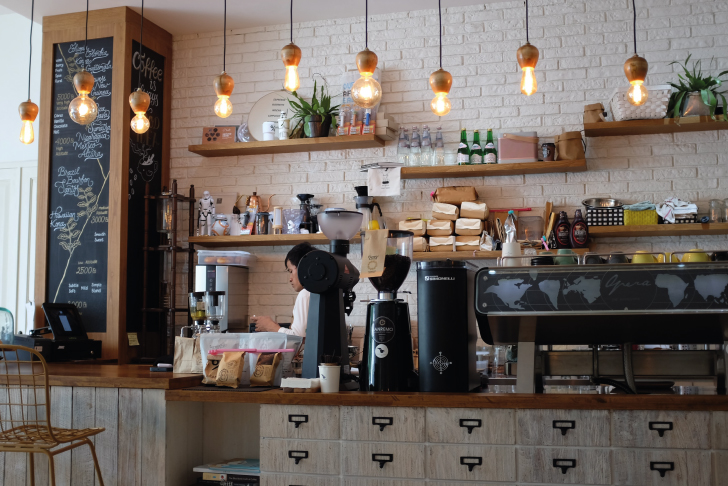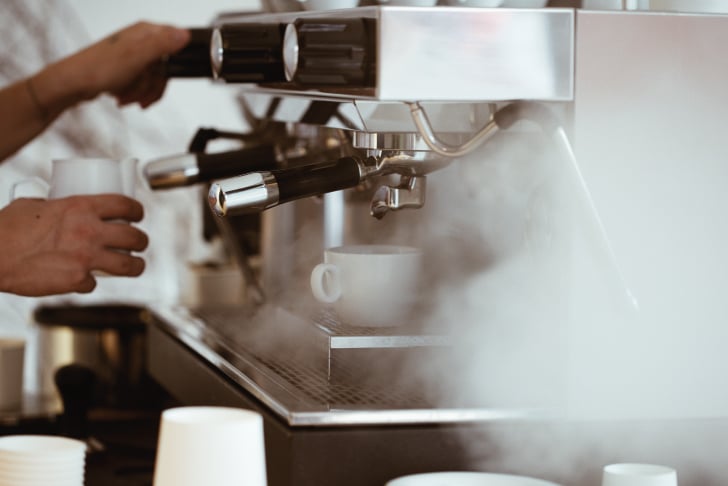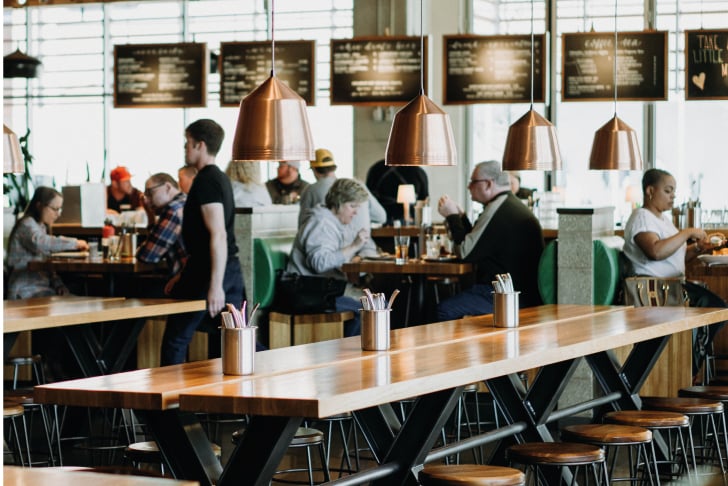Setting Up Your Coffee Shop

What is your niche?
Starting a business selling coffee isn’t as simple as appealing to South Africa’s coffee lovers with claims of pouring the best-brewed coffee in the land. In South Africa’s competitive small business landscape, you need a robust entrepreneurial mindset as well as a USP (unique selling proposition) that sets your business start-up apart.
In New York, coffee lovers are enjoying Crypto Baristas, where a cup of coffee is sustainable, environmentally friendly, and linked to NFTs (non-fungible tokens) and cryptocurrency. Closer to home, we have Community Coffee from Rwanda that use coffee beans which are processed anaerobically, providing much-needed economic stability for farmers in the war-torn region.
There are plenty of interesting local niches out there to spark imagination for your own business:
Kofi Afrika is a coffee shop in Soweto, on the famous Vilakazi Street, selling ethically sourced African bean coffee and a beetroot latte. 4WKS in Cape Town delivers fully compostable coffee pods featuring your favourite South African local roaster to your door - to name just two Mzansi ideas.
Do you need any training or industry knowledge?
Yes. Every successful coffee brewing business requires industry knowledge and some requisite training. This is partly because the South African coffee market is discerning and well-developed. This is a country that consumed 606,000 x 60 kg bags of coffee in 2017/2018!
The Speciality Coffee Association of Southern Africa (SCASA) endeavours to uplift South Africa’s coffee industry by offering exciting coffee-related events and products to the public. They are a non-profit organization, and an excellent place to start if you’re a business owner. Members enjoy access to a large network of professional coffee producers, roasters, retailers and equipment manufacturers.
They are also aligned with the Speciality Coffee Association (SCA) whose mission it is to engage, inspire, and expand a sustainable global specialty coffee community through leadership in events, education, and research.
Suppose your business plans involve serving food alongside your coffee as a way to make more money. Plan to get the appropriate food hygiene certification and licenses when you start your business so that you don’t run afoul of local law once your sole proprietorship is up and running.
Food safety in South Africa is regulated by different governmental bodies, including:
- the Department of Health
- the Department of Trade and Industry
- and the Department of Agriculture, Forestry and Fisheries
Lastly, a reputable marketing course will teach you everything you need to know about appealing to your target market, be it pour-over coffee or single serve.
A bookkeeping course enables the small business administration to run smoothly as you remember that your business needs are one part making money and one part accounting for where it’s all gone!
Where can you register your coffee shop?
Once you have your coffee shop's business name, you can register it with CIPC (Companies and Intellectual Property Commission). Then approach your local municipality for a trading licence, and a fire and health inspection.
Considering tourism's huge role in our country, get your business graded by the Tourism Grading Council to fast-track your word-of-mouth success to local and foreign coffee aficionados.
The costs involved in starting your coffee shop
Starting a new business in a highly competitive, niche industry requires writing a business plan where you calculate your costs – both start-up and running – to then work out an average cost per cup. You can then set a reasonable retail price with a clear per unit profit margin front of mind.
Good business principles require doing all your coffeemaker number crunching beforehand. Your start-up cup costs should include:
- Imported roasting machine = R500,000
- Espresso coffee machines = R60,000 – R500,000
- Coffee beans = R250 – R500 for a 1kg bag (which works out to 112 single-serve 8g espresso shots, taking into account losses and grinder fails)
- Drip coffee maker or french press = R200 – R15,000
- Domestic burr grinder for whole bean coffee = R600 – R15,000
- Mugs = R50 each
- Sugar or sweetener = 25c to 50c per sachet
Don’t forget to add milk (organic oat milk can get expensive) – and we’ve only begun to cover the hard cup costs!
Entrepreneurship can be an unforgiving vocation, and most start-ups fail within the first year. Create a business plan that leaves no stone unturned as you add up the costs of renting a shop in an area with high footfall (R3,000 – R6,000 per square metre), and POS software and equipment (R10,000 plus monthly operating costs of R900).
Our advice would be to stick to your core strengths. Roasting your own beans for long hours will leave you tired. It’s not easy to pour coffee, upload photographs, serve customers and analyse your expenses at the end of the business day on your own.
A good accountant is recommended for a VAT registered business. You could pay around R5,000 minimum a month. A starting salary for a trained barista is around R6,000 per month.
Proprietorship is pricey if you go at it alone. Your business start-up could set you back somewhere between R300,000 – R650,000 if you’re trying to get your own mobile coffee vending unit set up, and you’ll be looking to pour around 300 cups a day on average to make it financially viable.
If you’re looking to start a coffee shop in a mall or area with high footfall, expect to pay upwards of R100, 000 a month to cover the floor space rental, staff hire, equipment, and products, as well as affiliated marketing and accounting expenses.
Getting funding
It’s clear then, that starting your own business requires capital. Most start-ups fail because they lack the initial capital to keep their business running.
This is when the business idea needs to meet the business plan head-on in a well-articulated funding proposal document that outlines your business structure and shows that you’ve done your research on what it takes to create a business in the burgeoning coffee industry.
Our small business grants guide is your next port of call if your business demonstrates potential – but you don’t have the financial means to see it grow.
Likewise, you can take a look at our guide on small business loans, if that is a route you are considering.
Find out more: Need funding? Check out our guide on small business grants.
The Nuances of Starting Your Coffee Shop

Having done our number crunching, we can turn our attention to some of the more nuanced business ideas and considerations that go into starting a coffee shop in South Africa.
Location
If you’re looking to start a franchise over time, then the Starbucks model of ‘cluster marketing’ (whereby you open a few outlets within walking distance of each other) would suggest keeping affordable street corner retail in mind as you have room to grow. You might want to be close to a taxi rank or school (parents love their early morning coffee, as do commuters).
Tribe Coffee is one of Cape Town’s most beloved foundries and roasteries, and it has secured its fanbase by operating out of the heart of the artistic district of Woodstock, where food markets and art galleries thrive.
Likewise, Motherland Coffee is a popular brand up north that positions its branches in the heart of each neighbourhood. Being close to the action is key to successfully integrating your brand into the community.
If you want a coffee shop that affords you the lifestyle luxury of a midday surf, then look no further than the plethora of coffee sellers offering single-serve from beach parking lots and the entrance to popular tourist destinations.
Suppliers and quality control
Maintaining a healthy, long-term relationship with your suppliers is a pragmatic way to keep abreast of industry trends and develop trust regarding payment and delivery times. Someone will always offer you cheaper beans, but is it worth burning a bridge? These are the things you need to weigh up as you survive monthly, and then try to grow year on year.
Quality control in the coffee industry requires strict adherence to cleanliness, pouring times, and all aspects of the coffee chain involved in coffee flavour. The odd burnt bean can taint a roast flavour, just as a cup that’s not been appropriately rinsed can leave a poor aroma in a customer’s palette.
Fair trade is important too, with South Africa being affiliated with Fairtrade Africa that rewards the ethical and sustainable sourcing of cocoa beans. Bean There Coffee is South Africa’s first Fairtrade Certified coffee and other companies have since followed suit.
Your team
Employees need to be passionate about everything coffee. Friendly, approachable staff that have been well-trained will feel empowered in their knowledge of coffee tastes and be able to share that knowledge with the right customer.
From your cold-brew brewers to your Chemex pour-over, your manager to your waitrons, employees in a coffee shop are fuelled by solid leadership that starts with you as the small business owner. Free coffee to the staff doesn’t hurt either!
Get your legals sorted out
Hawker’s licenses are notoriously difficult to get in popular roadside locations, so assess the viability of a plan like this before embarking on a mobile coffee outlet that is destination specific. If you’re serving food alongside your coffee, you must visit your local municipality and apply for a food trader’s license. The cost will depend on the type of business you are embarking on.
Speak to a lawyer to ensure that you have limited liability (i.e. that your private assets are not at risk if the company fails). While not essential, displaying your barista and tourism grading certification prominently at your place of work will establish an aura of respectability as you grow your brand.
Marketing Your Coffee Shop

The importance of an online (and offline) presence for your coffee shop
Understanding your target market in the digital age requires establishing a daily rapport with your audience as you share stories and reels from your social media account about your coffee business and its culture as it grows. Everybody loves a great South African small business success story – you just have to start telling it.
Nothing is more powerful when it comes to marketing these days as ‘social proof’ - the idea that customers are more inclined to overlook price if they believe that their friends and the people they admire are buying a particular brand. Put your brand in your customers’ hands and let them speak about its value.
Loyalty schemes (one free coffee for every ten bought) and other incentives such as customer referrals or leaving a five-star online review are great ways to gain digital traction. As your brand soars up the SEO rankings through regular online interaction and website hygiene, so will your sales.
Attending trade shows such as Hostex, where events such as barista competitions and a dedicated coffee market are on offer, brings the industry together under one roof. They allow you to network and strengthen your marketing strategy by learning about the latest industry trends.
Find out more: Need more advice on this sector? Read our sector-specific articles.
Starting a Coffee Shop Is Not Your Only Option
If pursuing the start-up route seems like a risky venture, you don’t have to worry. There are other options available to become your own boss.
You can consider buying a coffee franchise as another appropriate route to business ownership. For example, Vida e Caffè has a local business success story that started in Kloof Street, Cape Town, and is now a multinational brand with franchise opportunities. Investors in South Africa find the franchise model less riskier than a start-up, so you might find it easier to secure financing this way.
Buying an existing coffee shop and turning it into a franchise could also be a feasible option for you. If you’re only considering this option and would like to conduct more research, you can reading our buying a business guide.
Regardless of the route you choice to take, you’ll need to understand what it takes to run a coffee shop successfully, so we recommend reading our dedicated article on running a coffee shop in South Africa.
We hope that you found this guide useful, and if you have any questions or you’d like to speak to a member of our team, please don’t hesitate to connect with us.
Wishing you a triumphant and successful business journey!
